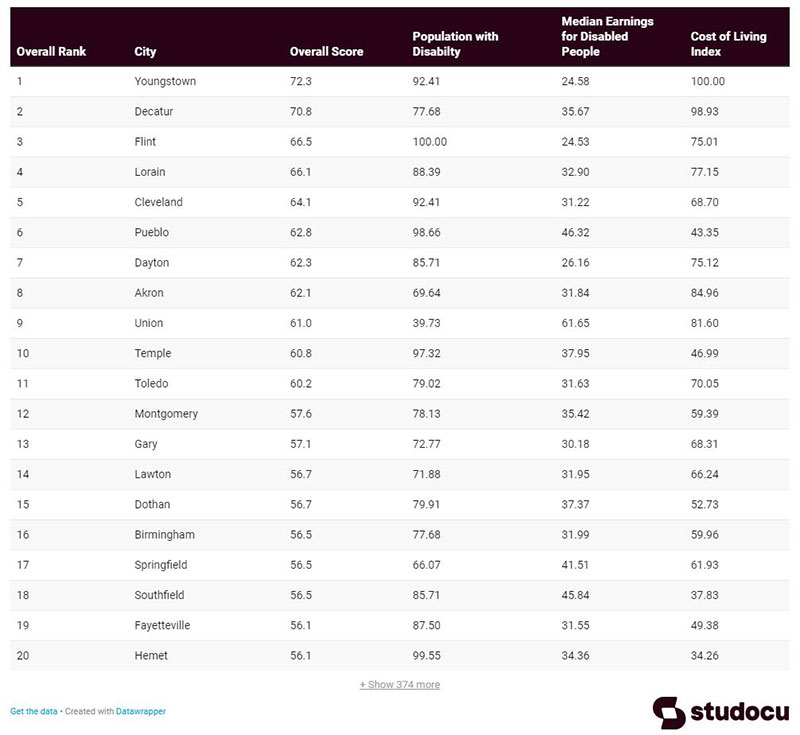5 Best and Worst US Cities for Students with Disabilities
When it comes to pursuing higher education in US, students with disabilities face unique challenges that can be influenced by the city in which they choose to study. Some cities go above and beyond to provide inclusive environments and support systems for these students, while others fall short, presenting significant obstacles.
The research team at Studocu decided to look at the bigger picture and see the best and worst states and cities for students with disabilities in the US based on accessibility.
According to Studocu the best five cities in the US for disabled students are: Youngstown, OH; Decatur, IL; Flint, MI; Lorain, OH and Cleveland, OH. Whereas the worst five cities are: Vista, CA; Provo, UT; Flagstaff, AZ; Ames, IA and Passaic, NJ. The states topping the list are New Mexico, South Dakota and Florida, while Wyoming, Wisconsin and Hawaii bring up the rear.
This article further explores the importance of accessibility and infrastructure, comprehensive support services, inclusive Campus Culture, accommodations and assistive technology, accommodations and assistive technology, employment and post-graduation opportunities for these students.
Accessibility and Infrastructure for Disabled Students
One of the key factors that determine a city's suitability for students with disabilities is its level of accessibility and infrastructure. The best cities prioritize accessible infrastructure, including wheelchair ramps, elevators and accessible transportation options.
These cities have invested in creating barrier-free environments, allowing all students to navigate their campuses and surrounding areas with ease. Conversely, the worst cities often lack the necessary infrastructure, making it challenging for scholars to move around independently and fully participate in academic and social activities.
Comprehensive Support Services to Meet Unique Disability Needs
Support services play a crucial role in ensuring collegiate success. The best cities have robust support systems in place, offering specialized academic assistance, counseling services and accommodations tailored to the unique needs of these students. These cities allocate sufficient resources to fund support centers and employ trained professionals who can provide guidance and support.

In contrast, the worst cities often struggle with limited funding, understaffed support centers and a lack of trained personnel, leaving students with disabilities without the necessary support to thrive academically and emotionally.
Campus Cultures Inclusive of All
The best cities foster inclusive environments where students of all abilities can engage in academic and social activities without facing discrimination or stigma. These cities promote disability awareness and offer disability-related clubs, organizations and events that celebrate diversity and inclusion.
Conversely, the worst cities often lack awareness and understanding, leading to a lack of inclusivity on campus and contributing to the isolation and marginalization of these students.
Accommodations and Assistive Technology Facilitate the Education Experience
Providing appropriate accommodations and access to assistive technology is crucial for students with disabilities to excel academically.
The best cities ensure that educational institutions offer a wide range of accommodations, including accessible classrooms, note-taking support, alternative testing methods and assistive devices. These cities also embrace technological advancements and provide coeds access to assistive technologies that enhance their learning experience.
On the other hand, the worst cities may have limited accommodations available, hindering the educational progress.
Employment and Post-Graduation Opportunities Solidify the Future
Beyond the academic realm, the best cities prioritize inclusive employment opportunities for disabled students. They work closely with local businesses and organizations to create a diverse workforce that values and supports individuals with disabilities.
These cities provide job placement services, internships, and mentorship programs specifically tailored to these young intellectuals, facilitating a smooth transition from academia to the workforce. In contrast, the worst cities may have limited employment opportunities, leading to higher unemployment rates and diminished prospects post-graduation.
Selecting the right city to pursue higher education is crucial for students with disabilities. While the best cities provide a variety of features to improve accessibility, the worst cities often lack these essential elements. It is vital for universities, communities and policymakers to prioritize the needs of disabled college kids and work towards creating inclusive and supportive environments across all cities. By doing so, we can ensure that every student, regardless of their abilities, has an equal opportunity to pursue their educational aspirations and thrive in their chosen field.
Pre-Register for Abilities Expo Today...It's Free!Sign up for the Abilities Buzz
Stay in the know on disability news and info.


